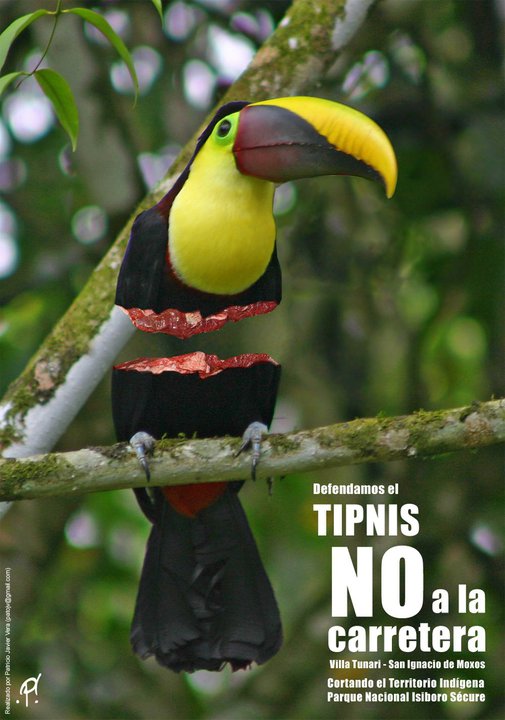This post is part of our special coverage Indigenous Rights and Forest Focus: Amazon.
Protests have continued by indigenous marchers to stop the building of a highway to go through TIPNIS, the Indigenous Territory National Park Isiboro Sécure, as Global Voices previously reported.
In the blog Bolivia Diary, Dario Kenner explains the conflict in depth and writes about the conditions the marchers have been facing:
Despite the indigenous peoples spending over a month marching, including with children and elderly people (there is a 99 year old marching!), in very difficult conditions and without proper supplies it is clear they are determined to reach an agreement that they feel will defend their rights and territory. For them this means the highway not going through the TIPNIS. It is surprising the Bolivian government has let the conflict go on this long because each day the issue generates more controversy which includes international petitions.
Dario goes on to report on the current situation:
There are still over 250 kilometres to go out of the total 500+ kilometres. There is currently a highly tense standoff due to a blockade which has been set up in Yucumo and the presence of 400 police who are stopping the marchers from advancing. An important rural social movement, the Confederation of Intercultural Communities of Bolivia (CSCIB), have been blockading in support of the highway and to demand the removal of five of the marcher’s demands (see full set of demands in part 2) and that the marchers dialogue with the government. This last point does not make sense because the very aim of the march is to get to La Paz and dialogue with the government. Everyone is praying there will not be any violent clashes, but the members of CSCIB who have been maintaining this blockade in Yucumo for over two weeks have threatened to stop the march from progressing – even though the indigenous march is peaceful and is not obstructing the road.
Police have suspended the march and blockaded the road to La Paz, Bolivia's capital, due to safety reasons, but a further explanation was not made. This, however, did not stop all protests. As reported by Bolivia Weekly:
A counter march of 300 people aligned with the government set off dynamite 200 meters away. The was was blocked yesterday [September 20] by 200 national police directed by Government Ministry official Boris Villena. Vice President Alvaro Garcia Linera said that the marchers could come negotiate in San Borja and justified blocking the tribal marchers because their demands would hurt families who squat on jungle lands.
A petition to Bolivian President Evo Morales to Stop the Destruction of the Amazon has been garnering international support. Concerns of injuries have been speculated, as lawyer Americo Romero M. (@americorom) wrote:
3 heridos Naranjal y 1 herido o fallecido dan diferente informacion en urundaiti…es confusa la informacion.
However, (@sobre_el_TIPNIS) lastly reported:
La situación en Yucumo ha mejorado un poco. El agua de la solidaridad de la gente ya llega a los y las marchistas. Gracias
You can read more reactions and reports on Twitter under the hashtag #TIPNIS.
This post is part of our special coverage Indigenous Rights and Forest Focus: Amazon.








3 comments
Another recent development is an international sign-on letter, supported by 61 environmental, human rights, and social justice organizations on five continents, and released by Amazon Watch. The signers emphasized that the proposed highway project threatens increased deforestation in TIPNIS and violates a protected area, and the indigenous rights and environmental ideals that Evo Morales’ government has publicly supported. You can read more about it and see the text here: http://woborders.wordpress.com/2011/09/22/international-solidarity-statement-with-bolivian-indigenous-march-and-isiboro-secure/